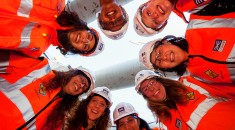Purpose
Previously, Social Sustainability topics had been included on the agenda of a joint HR/ Employment Relations Forum, attended by Crossrail and Tier 1 HR personnel. However, many of these had little involvement in management of Social Sustainability on the project, resulting in a mismatch between the agenda of the Forum and the interests of its members.
Another factor encouraging Crossrail to set up a dedicated Working Group in 2014 was that this coincided with the introduction of significant changes to the Social Sustainability Performance Assurance Framework (PAF) used to manage Tier 1 contractors’ performance. Whilst largely welcomed by Tier 1 contractors’ Social Sustainability leads, implementation of the revised PAF revealed areas where some were failing to comply with minimum contractual requirements. The first meetings of the new Working Group therefore focused on these areas through the sharing of examples of compliant practice from other contractors. These examples proved particularly helpful in encouraging non-compliant contractors improve their performance in areas which previously they had regarded as difficult to address.
As overall performance improved, the focus of meetings shifted to areas of good practice (known as “value-added” and “world class” performance under the Social Sustainability PAF). For each meeting, a theme from the PAF was chosen and an agenda developed to facilitate a detailed discussion about relevant initiatives and how best to implement them. Tier 1 contractors were invited to contribute presentations on their own experiences, and in some cases external guest speakers were also invited to take part.
Benefits
The benefits of the Working Group were manifold. Participation fostered greater collaboration with and between Tier 1 contractors and encouraged them to develop a common understanding of good practice. This was particularly important as members came from a wide range of disciplines (e.g., HR, procurement, community relations) and benefited greatly from the opportunity to exchange ideas and perspectives with others from different backgrounds. The Working Group also helped to maintain the momentum of Social Sustainability initiatives across the project and encouraged continuous improvement.
Other Learning Legacy Reports
Crossrail’s management of Tier 1 contractor performance is the subject of a more detailed Case Study on the evolution and operation of our Social Sustainability Performance Assurance Framework.
References
[1] Sometimes the term ‘Responsible Procurement’ is used to describe Social Sustainability activities on the Crossrail project. This term derives from the title of the relevant section of the contract.


